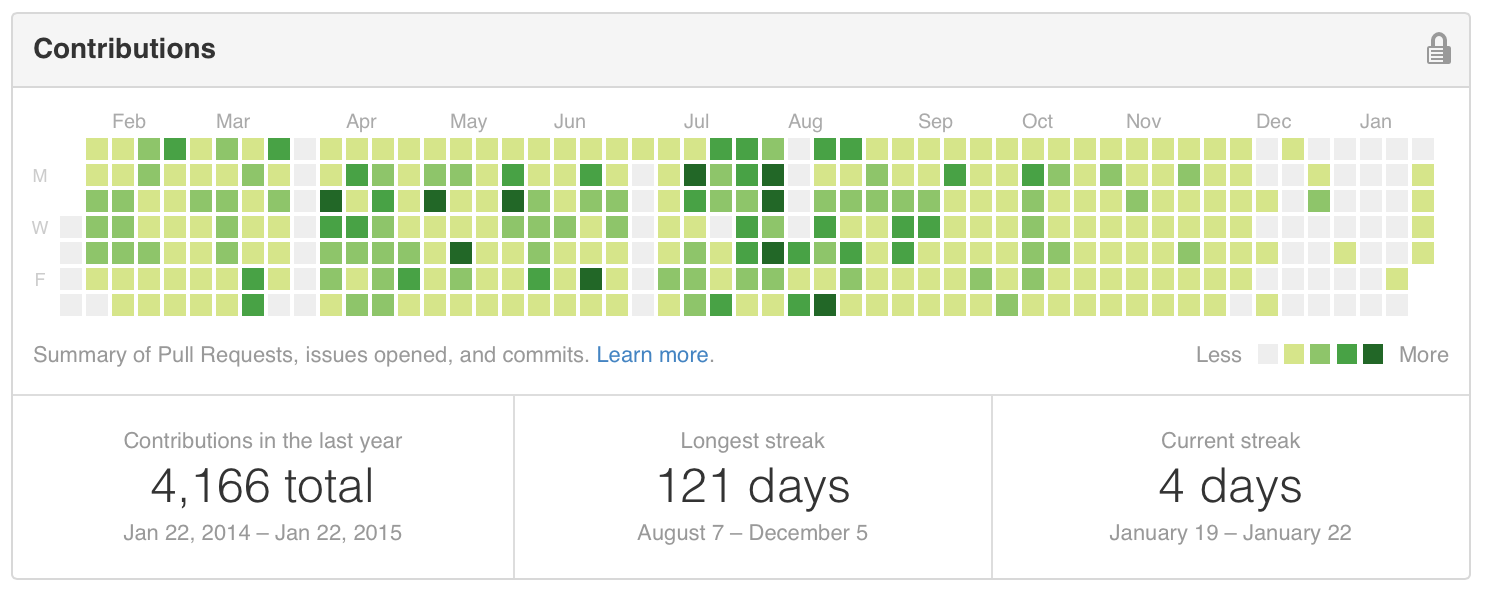Don't Break the Streak Maybe
The most important philosopher of our time, Jerry Seinfeld, has a major tip about productivity:
He told me to get a big wall calendar. For each day that I do my task of writing, I get to put a big red X over that day. Don’t break the chain. Skipping one day makes it easier to skip the next.
This is very simple advice that, when applied correctly, generates hundreds of millions of page views for your tech blog when you inevitably write about it in the context of technology and productivity and time management, which are themselves the Holy Trinity of Tech Journalism That Get People To Link To You. If Jerry Seinfeld had also said “don’t break the chain, and also I hate JavaScript” it would have hit The Tech Industry Traffic Sweet Spot and the internet would have collapsed.
Productizing
I’m into the idea of streaks. They work for me. But there’s also been an even more interesting conversation around the idea of productizing streaks.
When you take an inherently personal choice — choosing to accomplish a task on a regular basis — and put it into your product, you’re making a pretty large value statement. You’re saying that the task at hand is worth doing on a regular basis. This is usually true on the surface, but it still raises some interesting conversations about what that means.
It’s hip to put this concept into products these days, and for good reason: it encourages users to use your product regularly.
Strava has a couple “current week” widgets that makes you feel unhealthy when you’re not exercising:

Day One gives you a visual graph of the last fifty days of journal entries:

And, of course, Uber’s free-every-third-ride promotion:

Just kidding.
Games, of course, have honed these mechanics for years. Destiny, which I haven’t played because I have a life, much to the chagrin of my friends who should be in a twelve-step program, apparently only releases some weapons on specific days that you need to be online for. WoW has similar mechanics of getting you playing often and regularly. Anything to get people using your product over and over again.
What’s healthy, what’s not
I think there are spectrums of this behavior. GitHub, for example, has had our Contributions Graph up for a few years now. You get a colored square for every day you make write commit, a new issue, and so on.
Here’s my contributions graph for the last year:

We’ve gotten some flak — and appropriately so, I think — for suggesting that a streak includes weekends. If your concept of “GitHub” falls along the lines of being work-related, then yeah, working on the weekends might be unhealthy, depending on your perspective. For others, working on open source on the weekends is a hobby, and a break from the grind, so to speak. Still others enjoy seeing grey squares on weekends as a badge of honor, as proof that they’re able to disconnect. And, of course, there’s plenty of people who couldn’t possibly care whatsoever.
Like a lot of things in society, I think it usually comes down to the decisions of how you use a particular tool. And that’s tricky for a lot of reasons.
Take a look at my contributions graph above again. Having the concept of a daily “streak” was really, really helpful for me. I made a decision to build more than the previous few years (where I focused less on code and more on things like conferences and doing support), and that brought me a great deal of satisfaction and happiness. Promoting the concept of a streak helped me make my target, and I think it made me a better human last year.
Until it didn’t. At a certain point last fall, it stopped becoming a useful tool and became more of something I did because I did it because it was something I did. That, combined with a number of factors, led to some straight-up burnout. It’s a concept I’ve never really had to deal with. Shit, I like building things, why wouldn’t I get turned on from doing it often?
Know thyself
The difference, as I’m discovering while taking a few months off to pick up the pieces, is that you need to know what’s helpful to you and what’s not. And the real trick is that what’s helpful can be fluid. The problem really happens when you assume that what is helpful yesterday is the same thing that is helpful today. And they both can be different from what’s helpful tomorrow.
And humans are pretty shit at that, I think. It requires a lot of personal responsibility to ask yourself questions… and ask them frequently, at that. This goes for big things like work/life balance, but even for smaller things like gaming and exercise streaks. Are you working out too much, because that’s just what you do? Most athletes have gotten to the point of needing to step back and admit that whoa, I shouldn’t actually run this week because my knee is pretty fucked up right now, and I kind of wish I took it a little easier last time. Maybe then I wouldn’t have gotten to where I am now.
Man, that thought process is endemic to a lot of things in life.
Is productizing streaks a problem in our industry? Sure, at some level. Are some streaks healthy? Sure. Are some unhealthy? Sure. The real trick, though, is figuring out what really works for you, and not getting sucked into something if it ends up becoming less valuable to you.
Sometimes it’s great to break the streak.